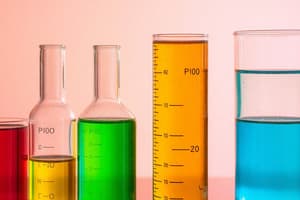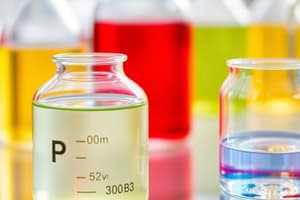Podcast
Questions and Answers
What is the pH value that indicates a neutral solution?
What is the pH value that indicates a neutral solution?
- pH 7 (correct)
- pH 14
- pH 5
- pH 10
Which of the following describes a soluble base?
Which of the following describes a soluble base?
- Neutral
- Acid
- Salt
- Alkali (correct)
What is the chemical reaction between an acid and a base called?
What is the chemical reaction between an acid and a base called?
- Neutralisation (correct)
- Oxidation
- Precipitation
- Combustion
Which substance is commonly used to neutralise acidic soil?
Which substance is commonly used to neutralise acidic soil?
What color does red litmus paper turn when placed in an alkaline solution?
What color does red litmus paper turn when placed in an alkaline solution?
What is a defining property of acids?
What is a defining property of acids?
What is one way to control risks when handling corrosive solutions?
What is one way to control risks when handling corrosive solutions?
How does litmus paper indicate whether a solution is acidic or alkaline?
How does litmus paper indicate whether a solution is acidic or alkaline?
What characteristic do all alkalis share?
What characteristic do all alkalis share?
Which of the following acids is found in lemons?
Which of the following acids is found in lemons?
What is the general pH range of acids?
What is the general pH range of acids?
Which of the following substances is an example of an alkali?
Which of the following substances is an example of an alkali?
What can be inferred about bases in relation to alkalis?
What can be inferred about bases in relation to alkalis?
Flashcards
pH
pH
A measure of the acidity or alkalinity of a solution. A neutral solution has a pH of 7.
Neutralisation
Neutralisation
The chemical reaction between an acid and a base. It results in the formation of salt and water.
Base
Base
A substance that neutralises an acid. Examples include sodium hydroxide (NaOH) and calcium oxide (CaO).
Universal Indicator
Universal Indicator
Signup and view all the flashcards
Salt
Salt
Signup and view all the flashcards
Acid
Acid
Signup and view all the flashcards
Alkali
Alkali
Signup and view all the flashcards
Corrosive
Corrosive
Signup and view all the flashcards
Concentrated
Concentrated
Signup and view all the flashcards
Dilute
Dilute
Signup and view all the flashcards
Indicator
Indicator
Signup and view all the flashcards
Litmus
Litmus
Signup and view all the flashcards
pH Scale
pH Scale
Signup and view all the flashcards
Study Notes
Acids and Alkalis
- Acids: Substances containing hydrogen, often liquids, that react with other substances to form salts. Some can burn or dissolve materials. Acids have a pH lower than 7 and taste sour. Examples include hydrochloric acid (in stomach), ethanoic acid (in vinegar), and citric acid (in lemons). Lab acids are corrosive.
- Alkalis: The chemical opposite of acids. They feel soapy and are bases. Examples include soap solutions and toothpaste. Lab alkalis are corrosive. Not all bases are alkalis.
- Corrosive: Substances that can burn or damage skin and eyes. Acids and alkalis can be corrosive.
- Concentrated: A high amount of solute (acid or alkali) dissolved in a solvent (usually water).
- Dilute: A low amount of solute dissolved in a solvent.
- Hazard Symbols: Warnings on chemicals indicating potential harm (e.g., corrosive, irritant).
Indicators and pH Scale
- Indicators: Substances that change color depending on whether a solution is acidic or alkaline. Red cabbage juice is a natural indicator.
- Litmus: A solution of dyes from lichens. Litmus paper (red and blue) responds to acids and alkalis (e.g., red litmus turns blue in alkalis, blue litmus remains blue in acids).
- Universal Indicator: A mixture of dyes that changes color to show the acidity or alkalinity of a solution.
- pH Scale: A scale measuring acidity or alkalinity. Pure water (neutral) is pH 7. Lower numbers indicate acidity, higher numbers indicate alkalinity.
Neutralization
- Neutralization: The chemical reaction between an acid and an alkali.
- Base: A substance that neutralizes an acid. Some bases dissolve in water (these are called alkalis).
- pH 7: Neutral pH.
- Uses of Neutralization: Dock leaves, quicklime/calcium oxide for soil, calcium hydroxide for factory waste, relief creams (for stings, acid/alkali treatment) and antacids for indigestion.
Making Salts
- Salt: A substance formed when an acid reacts with a metal or a metal-containing compound.
- Example: Copper sulfate crystals can be formed through such a reaction.
Studying That Suits You
Use AI to generate personalized quizzes and flashcards to suit your learning preferences.




